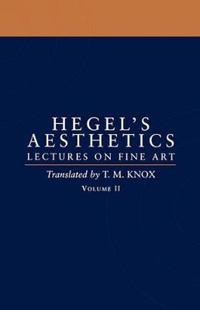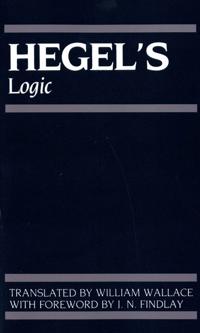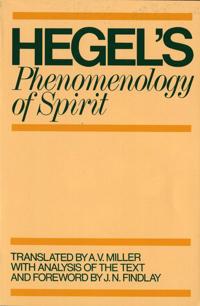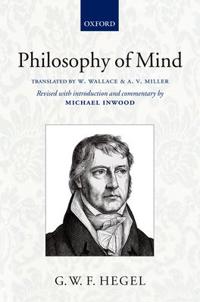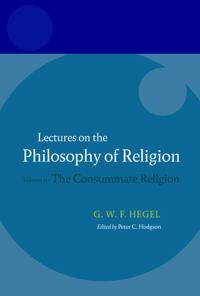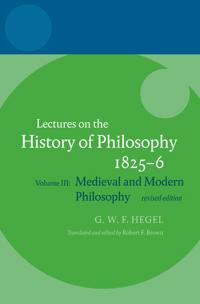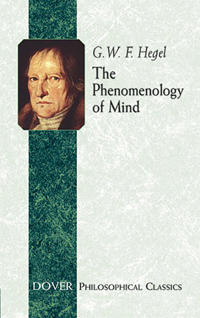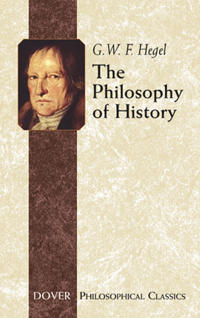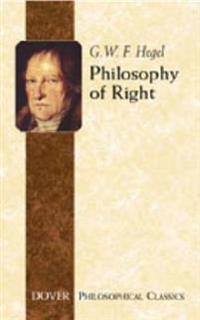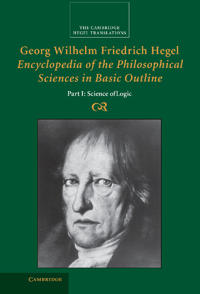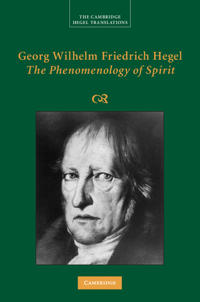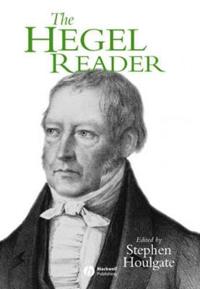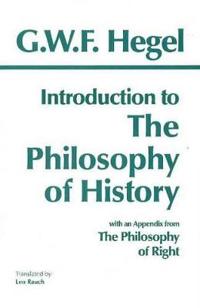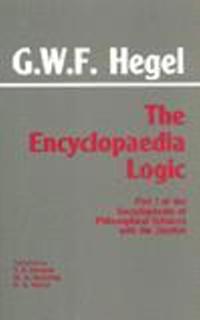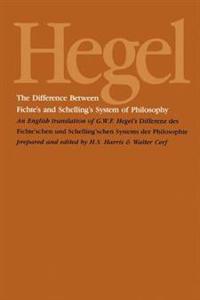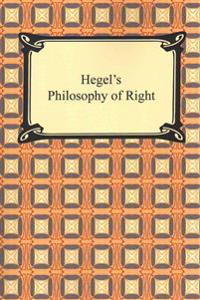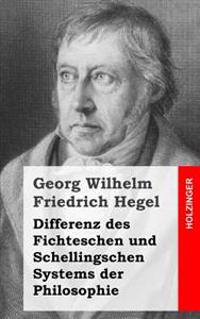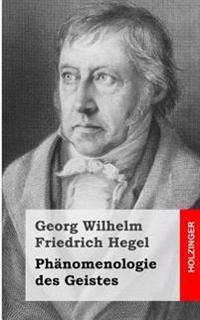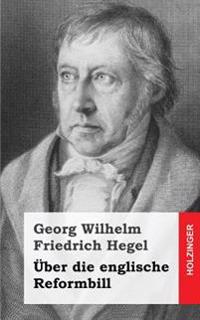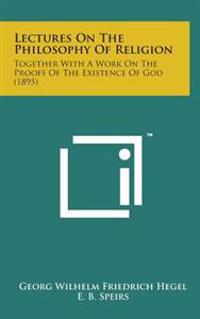Aesthetics (Häftad)
avGeorg Wilhelm Friedrich Hegel
ISBN: 9780198238171 - UTGIVEN: 199810In his Aesthetics Hegel gives full expression to his seminal theory of art. He surveys the history of art from ancient India, Egypt, and Greece through to the Romantic movement of his own time, criticizes major works, and probes their meaning and significance; his rich array of examples gives broad [...]
Hegel's Logic (Häftad)
avGeorg Wilhelm Friedrich Hegel
ISBN: 9780198245124 - UTGIVEN: 197505What I think remains sustainable and valid in Hegel's thought is the attempt to regard the ongoing crisis of reason as itself constitutive of self-consciousness. |s Revue Internationale de Philosophie |d 01/10/1996[...]
Phenomenology of Spirit (Häftad)
avGeorg Wilhelm Friedrich Hegel
ISBN: 9780198245971 - UTGIVEN: 197906This brilliant study of the stages in the mind's necessary progress from immediate sense-consciousness to the position of a scientific philosophy includes an introductory essay and a paragraph-by-paragraph analysis of the text to help the reader understand this most difficult and most influential of[...]
Hegel's Philosophy of Mind (Häftad)
avGeorg Wilhelm Friedrich Hegel
ISBN: 9780198750147 - UTGIVEN: 197002The present reissue of Wallace's translation of Hegel's Philosophy of Mind includes the Zusatze or lecture-notes which, in the collected works, accompany the first section entitled "Subjective Mind" and which Wallace omitted from his translation. Professor J. N. Findlay has written a Foreword and th[...]
Hegel: Lectures on the Proofs of the Existence of God (Inbunden)
avGeorg Wilhelm Friedrich Hegel
ISBN: 9780199213849 - UTGIVEN: 2007-03-29Lectures on the Philosophy of Religion (Pocket)
avGeorg Wilhelm Friedrich Hegel, Peter C. (EDT) Hodgson, R. F. (TRN) Brown
ISBN: 9780199283552 - UTGIVEN: 2008-03The Hegel Lectures Series Series Editor: Peter C. Hodgson Hegel's lectures have had as great a historical impact as the works he himself published. Important elements of his system are elaborated only in the lectures, especially those given in Berlin during the last decade of his life. The original [...]
Lectures on the History of Philosophy 1825-6 (Inbunden)
avGeorg Wilhelm Friedrich Hegel, Robert F. (EDT) Brown, R. F. (TRN) Brown
ISBN: 9780199568949 - UTGIVEN: 2009-09The Hegel Lectures Series Series Editor: Peter C. Hodgson Hegel's lectures have had as great a historical impact as the works he himself published. Important elements of his system are elaborated only in the lectures, especially those given in Berlin during the last decade of his life. The original[...]
Georg Wilhelm Friedrich Hegel: Lectures on the Philosophy of World History
ISBN: 9780199601707 - UTGIVEN: 2011-06This edition makes available an entirely new version of Hegel's lectures on the development and scope of world history. Volume I presents Hegel's surviving manuscripts of his introduction to the lectures and the full transcription of the first series of lectures (1822-23). These works treat the cor[...]
The Phenomenology of Mind (Häftad)
avGeorg Wilhelm Friedrich Hegel
ISBN: 9780486432519 - UTGIVEN: 200401The Philosophy of History (Häftad)
avGeorg Wilhelm Friedrich Hegel
ISBN: 9780486437552 - UTGIVEN: 200411Philosophy of Right (Häftad)
avGeorg Wilhelm Friedrich Hegel
ISBN: 9780486445632 - UTGIVEN: 200512Hegel's 1821 classic offers a comprehensive view of his influential system, in which he applies his most important concept--the dialectics--to law, rights, morality, the family, economics, and the state. The philosopher defines universal right as the synthesis between the thesis of an individual act[...]
Georg Wilhelm Friedrich Hegel: Encyclopedia of the Philosophical Sciences in Basic Outline, Part 1, Science of Logic
ISBN: 9780521829144 - UTGIVEN: 2010-10Hegel's Encyclopaedia Logic constitutes the foundation of the system of philosophy presented in his Encyclopaedia of the Philosophical Sciences. Together with his Science of Logic, it contains the most explicit formulation of his enduringly influential dialectical method and of the categorical syste[...]
Georg Wilhelm Friedrich Hegel: The Science of Logic (Inbunden)
ISBN: 9780521832557 - UTGIVEN: 2010-08This 2010 translation of The Science of Logic (also known as 'Greater Logic') includes the revised Book I (1832), Book II (1813) and Book III (1816). Recent research has given us a detailed picture of the process that led Hegel to his final conception of the System and of the place of the Logic with[...]
Georg Wilhelm Friedrich Hegel: The Phenomenology of Spirit
ISBN: 9780521855792 - UTGIVEN: 2018-02Hegel's Phenomenology of Spirit (1807) is one of the most influential texts in the history of modern philosophy. In it, Hegel proposed an arresting and novel picture of the relation of mind to world and of people to each other. Like Kant before him, Hegel offered up a systematic account of the natur[...]
The Hegel Reader (Pocket)
avGeorg Wilhelm Friedrich Hegel, Stephen (EDT) Houlgate, Stephen Houlgate
ISBN: 9780631203476 - UTGIVEN: 1998-10The Hegel Reader is the most comprehensive collection of Hegel's writings currently available in English. It contains four important "early writings", as well as selections from Hegel's mature writings and lectures which are central to his system and also have special relevance for post-Hegelian thi[...]
Hegel's Preface to the Phenomenology of Spirit (Övrig)
avGeorg Wilhelm Friedrich Hegel
ISBN: 9780691120522 - UTGIVEN: 2004-12-28This is a new translation, with running commentary, of what is perhaps the most important short piece of Hegel's writing. The Preface to Hegel's first major work, the Phenomenology of Spirit, lays the groundwork for all his other writing by explaining what is most innovative about Hegel's philosophy[...]
Introduction to the Philosophy of History (Pocket)
avGeorg Wilhelm Friedrich Hegel
ISBN: 9780872200562 - UTGIVEN: 1988-06'An elegant and intelligent translation. The text provides a perfect solution to the problem of how to introduce students to Hegel in a survey course in the history of Western philosophy' - Graham Parkes, University of Hawaii.[...]
The Encyclopaedia Logic (Inbunden)
avGeorg Wilhelm Friedrich Hegel, Theodore F. Geraets, W. A. Suchting
ISBN: 9780872200715 - UTGIVEN: 1991-11This is the first new version of Hegel's most fundamental text in more than a century. Like the original translation by William Wallace, it presents Hegel's final text of 1830, supplemented by the 'Additions' from his lectures. Hegel's prefaces for the Encyclopaedia are translated here for the first[...]
Difference between Fichtes Pb (Övrigt)
avGeorg Wilhelm Friedrich Hegel
ISBN: 9780887068270 - UTGIVEN: 198803Hegel's Philosophy of Right (Häftad)
avGeorg Wilhelm Friedrich Hegel
ISBN: 9781420938166 - UTGIVEN: 2010-01Georg Friedrich Handel Water Music for Three Guitars: From the Suite in D Major for Winds, Horns and Strings (häftad)
ISBN: 9781477533376 - UTGIVEN: 2012-06Differenz Des Fichteschen Und Schellingschen Systems Der Philosophie (Häftad)
avGeorg Wilhelm Friedrich Hegel
ISBN: 9781484031780 - UTGIVEN: 2013-04Phanomenologie Des Geistes (Häftad)
avGeorg Wilhelm Friedrich Hegel
ISBN: 9781484031810 - UTGIVEN: 2013-04Uber Die Englische Reformbill (Häftad)
avGeorg Wilhelm Friedrich Hegel
ISBN: 9781484031940 - UTGIVEN: 2013-04Lectures on the Philosophy of Religion: Together with a Work on the Proofs of the Existence of God (1895) (Inbunden)
avGeorg Wilhelm Friedrich Hegel
ISBN: 9781498151122 - UTGIVEN: 2014-08

